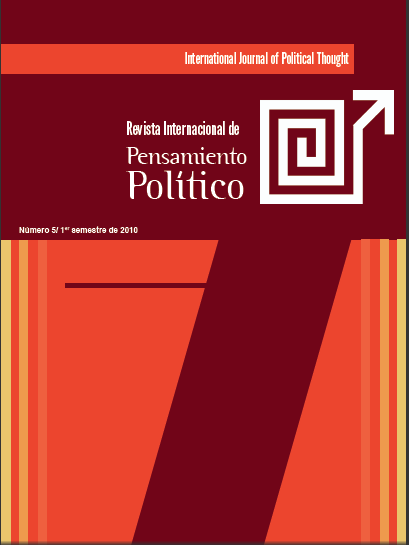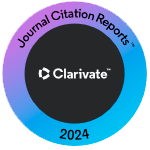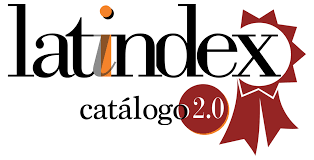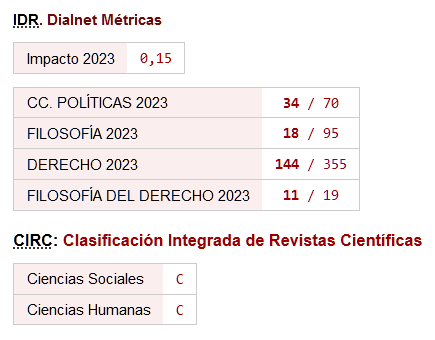¿Qué es la demoarquía? Ontología constitutiva y complejidad en la democracia
DOI:
https://doi.org/10.46661/revintpensampolit.1806Palabras clave:
Complejidad, Procedimientos, Universalización, Demoarquía, DemocraciaResumen
Los gobiernos deberían coordinar las acciones de la ciudadanía y no decidir las políticas de forma unilateral. La complejidad es el paradigma donde la democracia tiene sentido. Tratar de reducir la complejidad significa simplificar la democracia. Democracia debe respetar la complejidad humana y social. El concepto de demoarquía intenta integrar esa complejidad. En este trabajo analizo el concepto de demoarquía y señalo sus principales contribuciones al estudio de la filosofía de la democracia. La acción ciudadana en este paradigma ha de completarse con una ontología constitutiva que hace de una subjetividad prescriptiva y creativa el motor de la construcción del autogobierno y sus procedimientos.
------------------------------------------------------------------------
Governments should coordinate the actions of the citizenry and not decide policy unilaterally. Complexity is the paradigm where democracy makes sense. Attempting to reduce complexity is to simplify democracy. Democracy is synonymous with respect towards human and social complexity. The concept of demarchy attempts to integrate that complexity. In this paper, I analyze the concept of demarchy, and I point out to its main contributions to the philosophy of democracy. Citizen action within this paradigm should be complemented by a new constitutive ontology which makes creative and prescriptive subjectivity the engine for the construction of selfgovernment and its procedures.
Descargas
Citas
Albert, M., Cagan, L., Chomsky, N., Hahnel, R., King, M., Sargent, L., Sklar, H., Liberating Theory, South End Press, Boston, 1986.
Barber, B., A Passion for Democracy, Princeton Univ. Press, Princeton, 1998. Burnheim, J., «Power-trading and the
environment», en Environment Politics, vol. 4, nº 4, pp. 49-65.
Burnheim, J., Is Democracy Possible? The Alternative to Electoral politics, University of California Press, L.A., 1985.
Clark, M., Antonio Gramsci and the Revolution that Failed, Yale University Press, New Haven, 1977. DOI: https://doi.org/10.3817/0677032241
Fernández Buey, F., (ed.), Actualidad del pensamiento político de Gramsci, Grijalbo, Barcelona, 1977.
Foucault, M., Microfísica del poder, La Piqueta, Madrid, 1979.
Fung, A., Wright, E.O., Deepening Democracy. Institutional Innovations in Empowered Participatory Goverance, Verso, New York, 2003.
Gallardo, H., Política y transformación social. Discusión sobre derechos humanos, Tierra Nueva, Quito, 2000.
Gidlow, L., The Big Vote. Gender, Consumer Culture, and The Politics of Exclusion 1890s-1920, The Johns Hopkins University Press, Baltimore, 2004.
Hardt, M., Negri, A., Commonwealth. The Belknap Press of Harvard University Press, Cambridge, 2009.
Hayek, F., Law, Legislation and Liberty, V. 3, The University of Chicago Press, Norfolk, 1979. DOI: https://doi.org/10.7208/chicago/9780226321264.001.0001
Lessing, D., Memorias de una superviviente, Salvat, Barcelona, 1987.
Meszaros, I, A necessidade do controle social, Ensaio, Sao Paulo, 1987.
Miliband, R., Socialismo para una época de escépticos, Siglo XXI, México, 1997.
Morin, E., Kern, A. B., Tierra Patria, op. cit., pp. 191 y ss.
Morin, E., El método. La vida de la vida, Cátedra, Madrid, 1994.
Ricoeur, P., Lectures 1. Autour du Politique, Seuil, Paris, 1991.
Rodríguez Prieto, R., Ciudadanos soberanos. Participación y democracia directa, Almuzara, Córdoba, 2005.
Sanbonmatsu, J., The Postmodern Prince: Critical Theory, Left Strategy, and the Making of a New Political Subject, Monthy Review Press, New York, 2004.
Stanley, L., Wise, S., Breaking out again. Feminist ontology and epistemology, Routledge, New York, 1993.
Villasante, T. R., «Cuatro redes para mejor vivir», en Monereo, M. y Chaves, P., Para que el socialismo tenga futuro. Claves de un discurso emancipatorio, Fundación de Investigaciones Marxistas-El viejo Topo, 1999.
Villasante, T. R., Democracias participativas, HOAC, Madrid, 1995
Wainwright, H., Arguments for a new left. Answering the Free Market Right, Blackwell, Cambridge, 1994.
Wolin, S. S., Democracy Inc. Manager Democracy and the Specter of Invertid Totalitarism, Princeton University Press, Princeton, 2008.
Descargas
Publicado
Cómo citar
Número
Sección
Licencia
Derechos de autor 2016 Revista Internacional de Pensamiento Político

Esta obra está bajo una licencia internacional Creative Commons Atribución-NoComercial-CompartirIgual 4.0.
Política de acceso abierto
Se permite el acceso libre y abierto de cualquier interesado a todos los contenidos de los números de la revista, sin costo alguno, pudiendo imprimir y trasladar todos los artículos, con la única condición de precisar la fuente y la autoría.
La revista: a) no cobra a las autorías costes por el procesamiento de los artículos ni por el envío de los mismos, b) mantiene el copyright para los autores sin restricciones, c) facilita a los autores conservar sus derechos de publicación sin limitaciones.
La Revista Internacional de Pensamiento Político es una obra original del Laboratorio de Ideas y Prácticas Políticas de la Universidad Pablo de Olavide. Todos los artículos incluidos en la Revista son obra original de sus respectivas autorías. Esta Revista se ofrece libremente a la comunidad científica y académica sin coste alguno y libera los contenidos de acuerdo a la licencia "Reconocimiento-NoComercial-CompartirIgual 4.0 CC BY-NC-SA" del proyecto Creative Commons dispuesta en la siguiente url: https://creativecommons.org/licenses/by-nc-sa/4.0/legalcode
Si deseas traducir o compilar alguno de los artículos aquí disponibles, por favor, ponte en contacto













